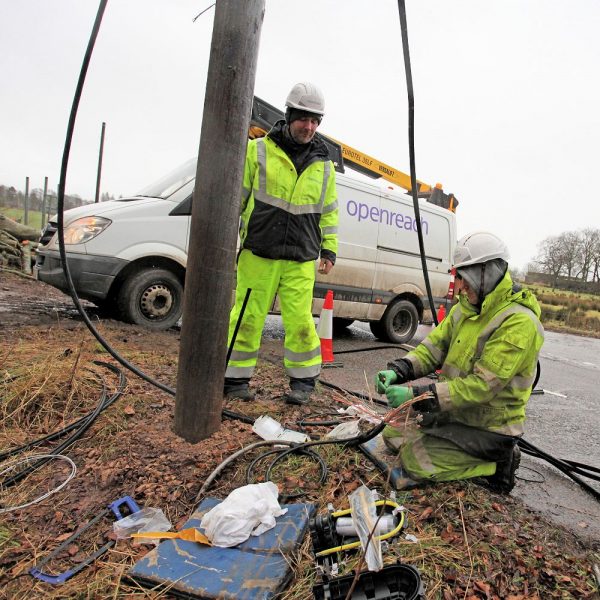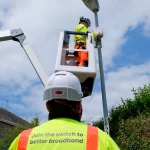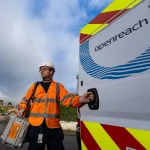Openreach UK Prepares for Another Winter of Storm Damage

Network access provider Openreach (BT) is stepping up their preparations for another harsh winter, which last year saw multiple street cabinets and 750 “telephone poles” damaged in storms (example). Such damage can cause significant disruption to broadband and phone services, but the operator aims to do better this year.
Naturally, flooding, snow, major power cuts and high winds aren’t exactly kind to modern communication networks, which is particularly true in rural areas where it may take longer to correct for significant infrastructure damage.
Nevertheless, Openreach are playing it safe and preparing for more of the same this year, which is why they’re already stocking up on essential items, so their engineers can stay safe and warm on the road, including thousands of snowshoes, snow socks for vehicle tyres, bags of salt and litres of screenwash etc. A fleet of 4×4 vehicles is also strategically placed around the UK to reach isolated and extremely rural communities quickly.
Advertisement
The operator has also been reviewing its approach to extreme weather after last year’s events (e.g. they setup a new Storm Response Unit), which aside from ensuring engineers are prepared, also means they’ve been “looking at whether the network can be re-routed in areas that have proved to be particularly vulnerable to storms in recent years” and “reviewing how information on any disruption is shared with communities.” Communication has not always been their strongest point.
Chris Herbert, Openreach’s Director of Customer Service, said:
“It’s impossible to predict exactly what kind of winter is ahead of us, but we’re doing everything we can to prepare for it.
The most important thing to us is keeping our engineers and the public safe. Our people are out in all conditions and in some of the most rural and remote areas, whether that’s fixing and maintaining the network, or building new full fibre connections
One period in February last year saw three named storms hit in just six days. Storms Arwen and Eunice were especially destructive – the former saw an extra 12,000 faults reported to us in a single week.
Thankfully some heroic work by our engineers restored services to 13,000 customers within just four days and the power related issues were resolved a week after the initial storm impact.”
The real test of all this will be whether Openreach can show that the work they’ve put in to develop new, specific processes to deal even more effectively with extreme weather events can actually deliver a tangible improvement, when the worst does eventually happen. At present, it’s difficult to independently assess this, and nothing they do is going to completely stop some physical damage from occurring.
The company has also pulled together some common-sense tips for phone and broadband users, which we’ll paste below.
Openreach’s Tips
Tell your provider if you’re vulnerable:
Let your phone or broadband provider – the company you pay your bill to – know if you or a family member is vulnerable (Ofcom guidance), so you’ll be prioritised, wherever possible, during any repair work.
Prepare for an outage:
Make sure your mobile phone and any spare battery packs are fully charged if you know extreme weather is approaching. It could provide you with vital access to help, online services and contact with friends and family.
Report damage:
Outages can happen because trees or branches hit our cables and equipment. You can help us fix things faster by reporting this kind of issue directly to us online or by calling 0800 023 2023. Use a What3Words location to help us pinpoint the damage.
Check your power:
We have backup plans in the event of local power cuts to keep our network running, but you might find it hard to connect if your own power is disrupted.
Consider upgrading to Full Fibre:
Our Ultrafast full fibre broadband network now reaches more than 9 million homes and businesses across the UK. As well as being faster, more reliable and future-proof, it’s also less affected by things like flooding. Check now to find out if you can upgrade.
More information:
If phone and broadband services are disrupted, you can find out the latest information we have at openreach.com. Always report a fault to your service provider so we know there’s a problem.
The ‘check your power’ tip above seems less like a “tip” and more like a statement of reality, although we recommend reading our ‘Solutions for Battery Backup‘ article to get a bit more context on your options. The suggestion of upgrading to full fibre is also all well and good, but then they’re deploying a lot more telecoms poles to deliver part of this, which do tend to be a bit more susceptible to extreme winds and falling branches.
Advertisement
Finally, Openreach recommends people visit their website to “find out the latest information” on disrupted services, but if there’s one major feature that their website lacks then it’s a useful summary of live network faults and disruptions across the country. Such a feature, particularly one that includes more than just the most basic details, would be extremely helpful.
Mark is a professional technology writer, IT consultant and computer engineer from Dorset (England), he also founded ISPreview in 1999 and enjoys analysing the latest telecoms and broadband developments. Find me on X (Twitter), Mastodon, Facebook, BlueSky, Threads.net and Linkedin.
« Starlink Powered WiFi Brings Broadband to Remote Caravan Site






















































If you report storm damage you may find that you shoot yourself in the foot. On two occasions we have had overhead cable hanging down to head level after a storm. You might think that the appropriate solution would be to pull the slack back up to the top of the pole. What actually happened was that a BT Openreach engineer cut the cable and tied the ends to the two poles leaving everyone with no connection for between one and two weeks.
I have my own pole and I am on a LL so if mine does that they will repair it in 5 hours. I don’t care for the poor folk with rubbish internet. I am gold standard and i’ll be alright jack 🙂
Here is a crazy radical idea. But why not for those areas known to be high risk of damage from storms and floods. Concentrate on switching them all to FTTP first? Will this not save money in the long run?
…or better still, don’t build housing in flood prone areas.
Switching to FTTP won’t help. Openreach try to reuse existing poles. They don’t AFAIK, dig up the street, unless ducts are blocked.
FTTP isn’t impacted by flooding. Copper and FTTC cabinets it’s a different story.
Ah, ok.
What a load of rubbish
If BT started to use composite poles that are much stronger than wooden poles they would not have as many issues.